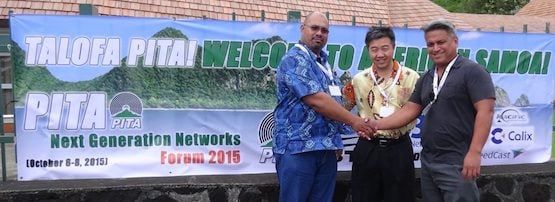
Last month the national telecommunication providers for Tuvalu (Tuvalu Telecom) and the Federated States of Micronesia (FSM Telecom) signed a core network co-sharing agreement.
As part of the agreement, FSM Telecom will provide Tuvalu Telecom with access to its core network infrastructure, saving Tuvalu Telecom millions in new infrastructure costs. It will also mean that the two telcos will share a common core network, allowing them to easily route calls directly between countries.
Mr Anisi Penitusi, Chief Operations Officer at Tuvalu Telecom, said the core network infrastructure is one of the most expensive outlays for a telecommunication provider and is a key component to now allow them to offer services such as 3G to their customers.
“This arrangement allows us to immediately offer mobile broadband and other modern services to our citizens without the high capex (capital expenditure) investment in core network infrastructure,” says Anisi. “We can now focus our very limited resources on developing and enhancing our access networks to [further] extend broadband to our citizens.”
His FSM counterpart, Mr. Fredy Perman, Chief Operations Officer and Executive Vice President of FSM Telecom, says the decision was a win-win for both parties.
“We have spare capacity in our new mobile core network system, so why not [share it],” says Fredy. “[The agreement] allows us to use excess capacity and recover costs more quickly on our large investment for our infrastructure.”
PITA provides opportunities to cooperate, regionally and with the world
Like many other small island states in the Pacific, Tuvalu and FSM share similar geographic and economic challenges associated with their small and dispersed populations.
Fred Christopher, Manager of Pacific Islands Telecommunications Association (PITA), says economies that share these challenges benefit most when they cooperate and share resources, as is the case between Tuvalu and FSM.
PITA works to improve, promote, enhance, facilitate and provide telecommunications services within Member and Associate Member economies.
“While we always support each country’s wish to build its own infrastructure and human capacity, sharing expensive resources will be most economical in the short term,” says Fred.
“It will help with upgrading services more quickly, which in turn will provide customers with faster Internet speeds, particularly mobile Internet, and other applications that can help with disaster and emergency communications, education and health, to name a few examples.
“What should not be forgotten is sharing does not need to be restricted to a specific region, distance, or application either, given the advances in technology and policies.”
Fred invites industry players of other economies to meet PITA Members at PITA organized forums to explore development and sharing opportunities in the Pacific.
Learn more about PITA and its next events.
Read more on the new agreement on the PITA website.
The views expressed by the authors of this blog are their own and do not necessarily reflect the views of APNIC. Please note a Code of Conduct applies to this blog.
